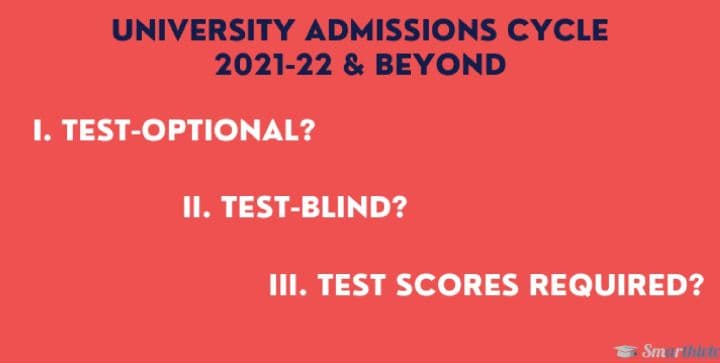Test-Optional Applications in 2021-2022

The year 2020 has been unprecedented. Non-surprisingly, colleges and universities around the world have felt its impact in various ways. Professors being concerned about teaching in class, hybrid models with a portion of classes online vs in-class, smaller class sizes, potential Covid-19 outbreaks in the student body and a reduction in revenue/enrollment due to a massive decline in sports events.
On top of all that admissions offices were forced to revise their ways-of-working, as their proven models were incompatible with the challenges faced by students.
Think cancellations of SAT and ACT tests throughout the country and in other corners of the world. Or think of applicants who are not able to travel to test centers. This is the topic of today's Friday Scholarship Guide.
SAT/ACT Cancellations
For rookies: In case you have not yet heard of the SAT/ACT test and why getting a standardized test score usually matters a great deal for the college recruiting process, learn more about the various test formats in our Recruiting Guide: SAT Test and ACT Test
.No matter where in the world, you may have come across SAT and ACT test center closings.
Ideally, you were informed weeks before the actual test date, but we have also seen announcements as late as the days leading up to it. Some of our athletes have been affected by this several times throughout the year and they saw themselves register over and over again, hoping they'd get a spot for one of the few 2020/2021 dates.
In other countries, tests are not even offered at all or only limited to a few times a year and together with travel restrictions, this has led to some real obstacles for students.
The good news is, universities (some more quickly than others) reacted, announcing that they would go ...
Schools Going "Test-Optional" & "Test-Blind"
... for the 2020-2021 and more importantly for you, the 2021-2022 application cycle. Some schools even extended the test moratorium to 2022-2023; which means one thing in plain English:
Depending on the university, you may see a policy called "test-blind" instead of "test-optional", which means admissions would completely disregard if you even were to submit college-entrance test scores. Scores would not be reviewed by the admissions staff. While it's hard to keep track of all the dynamics in education right now, there are some useful resources, such as this "List of All Test Optional Colleges 2021", provided by "Insight Education".
The change in policy is great news for a lot of people and definitely changes the way college coaches recruit to a large extent. We still see some coaches asking for scores and they may have their reasons for doing so, but provided many universities have gone test-optional or test-blind there is no need for an official result in most cases; also because:
Impact on my Recruiting Process & College Applications
Chances are you have already applied to a number of schools "Early Action" or "Early Decision" even, but if not the "Regular Application Deadlines" of the schools recruiting you will get closer sooner or later.
It means the following:
- The weighted composition of your submitted application material may change
- Other elements of your application (your academic background, achievements, essays, extra-curricular activities, etc.) matter more than before
- Your class curriculum and cumulative GPA, perhaps even GPA development, become more relevant
But it may also mean reduced pressure for you to do well on college-entrance exams.
Example: Say, you have a seat for the ACT in April 2021. Technically you could still study for the exam, wait and see whether it will take place and see how well you do. Whether you then report the ACT score or not is a different question, but it leaves you with some options.
It certainly gives you a better idea of the kind of school you may have a better or worse "Personal Fit" with. Think ACT (or SAT) mid-range, which is often a very neat indicator for you to know how well you'd fit in academically.
Recruiting Advice: Interested to understand what the "Personal Fit" is all about? It's the Smarthlete approach, ensuring student athletes commit to a program not only based on athletics and other criteria, but also taking into consideration other factors, such as the "Mid-Range". It's a 5-star scale, giving you a quick idea of how well you'd fit in athletically and academically. Imagine looking up any school and whether you'd have a realistic shot of making the team. Available right away by signing up with a free recruiting profile on Smarthlete.
These are truly odd times, but apply what you've learned to do in your sport without a doubt: Hang in there, keep working hard and it will pay off!